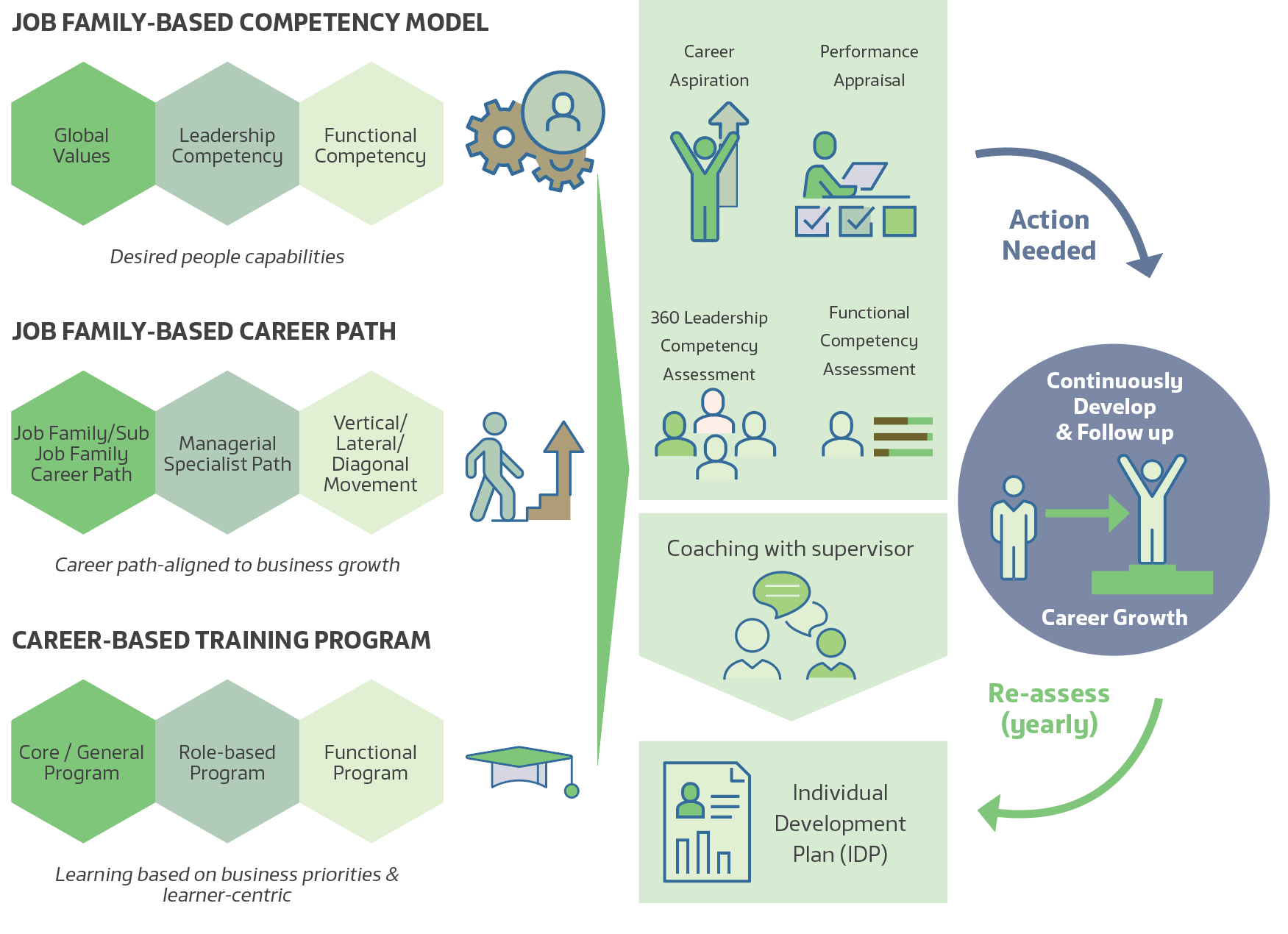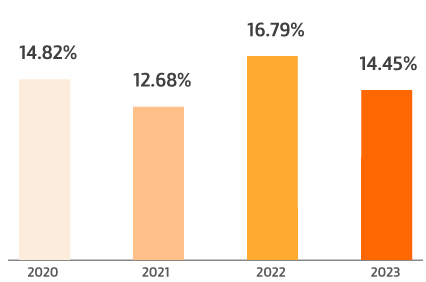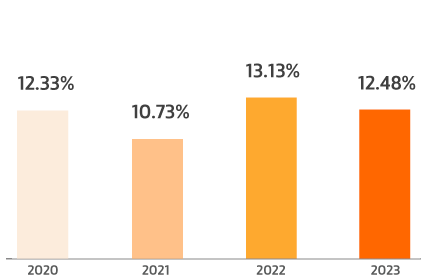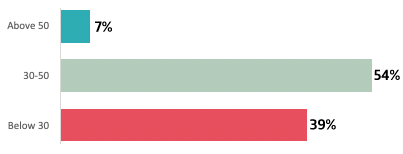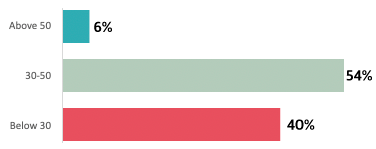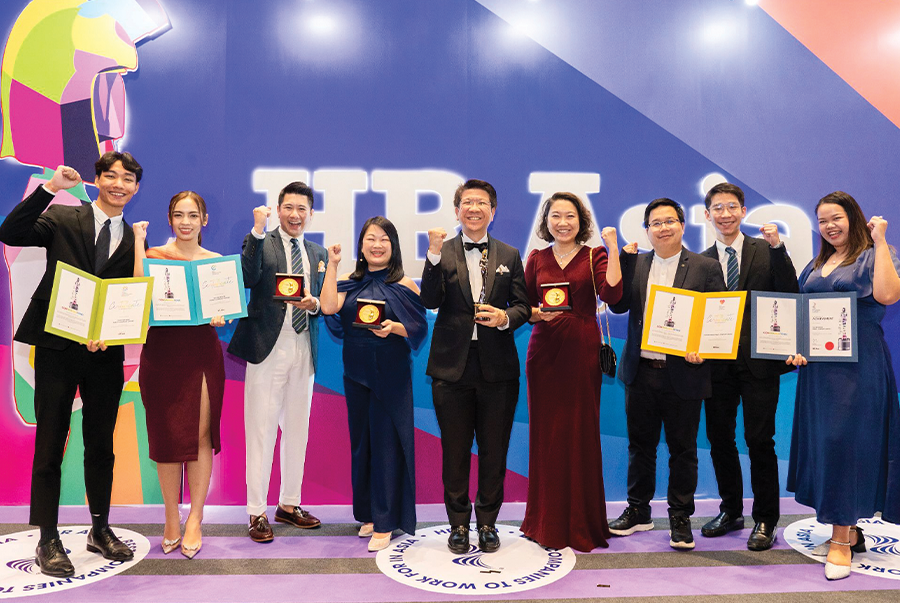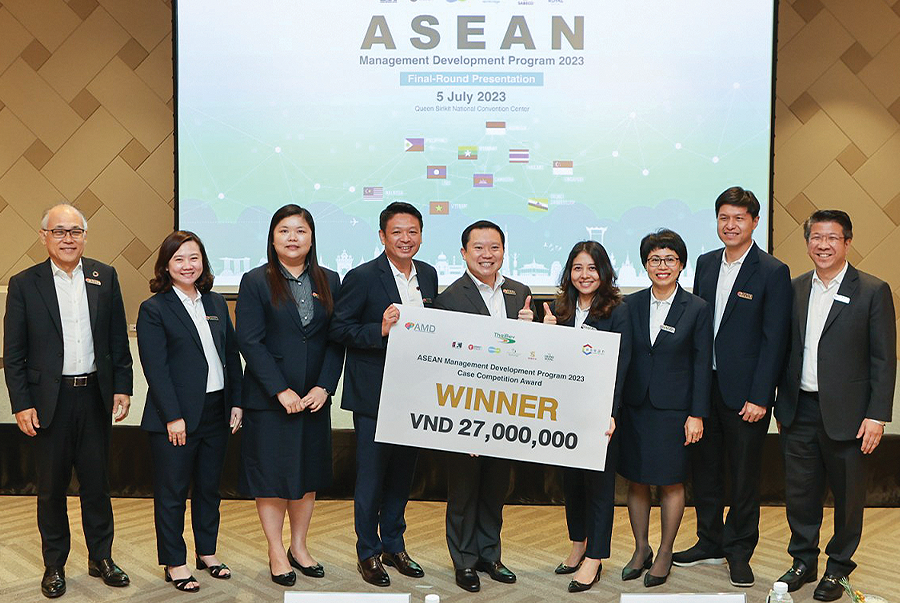ThaiBev places great emphasis on developing human capital and strengthening organizational capabilities, and has established the Human Capital and Organization Capabilities (HC&OC) to support the company’s aspiration to become
a stable and sustainable ASEAN leader.
HC&OC works closely with the Human Capital Business Partner (HCBP) in each product group and business unit,
to establish the HC&OC strategy, policy, and plan to support business strategies and objectives.
In addition, the central HC&OC works with each country/market HC&OC Support & Operations teams to ensure both execution of HC&OC strategy and excellence in HC service delivery, in order to create meaningful employee experiences at every touchpoint.
This management approach enables ThaiBev to develop
and mobilize talent across countries and business units,
and helps to foster collaboration and share best practices,
in line with our “Limitless Opportunities” objective.
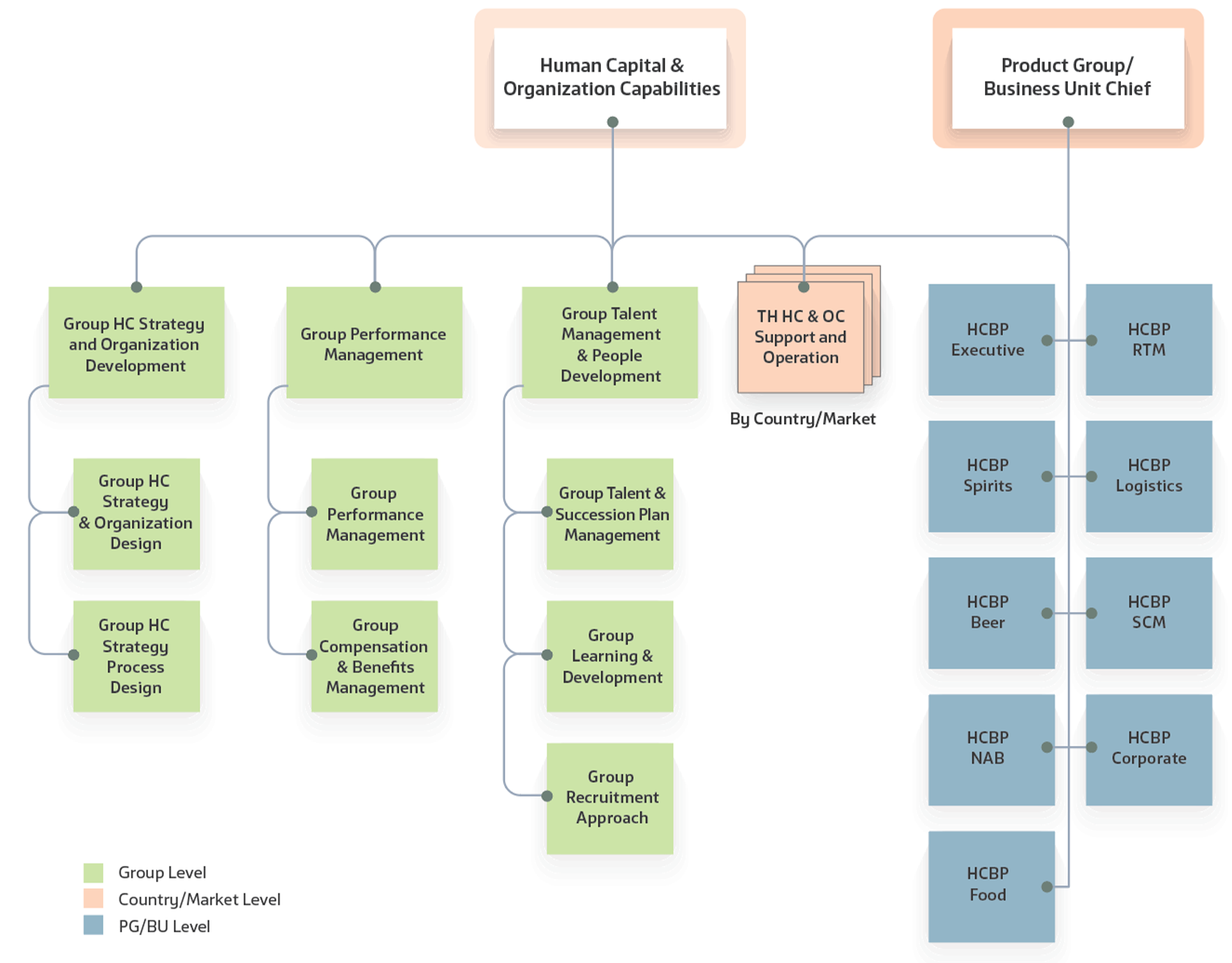
ThaiBev strives to provide limitless opportunities for employees, incorporating diversity, equality, and inclusiveness
into our business operations. The company aims to ensure equal opportunities for its diverse workforce to grow in their careers. To strengthen human capital, create oneness, enhance diversity awareness, and prepare employees
for change, ThaiBev has identified seven human capital management strategies:
|
Clear Structure and Roles |
- Arrange the organizational structure, roles, and responsibilities to
support the company’s business strategy and PASSION 2025.
- Expand and develop competencies and options for career paths
corresponding to ThaiBev’s organizational structure, roles and
responsibilities.
|
|
Market-oriented
Compensation and Benefits |
Continuously monitor job market dynamics and ThaiBev’s demand
for personnel to set appropriate compensation and benefits
standards for ThaiBev Group companies. |
|
Recognition-based
Performance Management |
- Develop a comprehensive employee performance management
system and expand channels for system accessibility that meets
the needs of employees in all age groups.
- Ensure fair performance evaluation and set talent development plans
to unlock employee potential, enabling them to work towards their
goals, and strive to achieve excellence.
|
|
Holistic People
Development |
Promote a learning culture for employees to develop their
capabilities. ThaiBev develops employees’ potential according
to the 70:20:10 model* for learning and development. It also
emphasizes digital literacy and the implementation of individual development plans (IDP), as well as employee progress-tracking. |
|
Proactive Succession and Workforce Planning |
Prepare employees and executives identified as potential successors to ensure seamless transitions and business continuity, enhancing the sustainability of the organization. |
|
Strategic Talent Acquisition and Onboarding |
Recruit and select personnel who have appropriate knowledge,
abilities and skills to perform their jobs as required by the
organization and aim to reach and attract potential candidates to
join the organization, especially those from the new generation,
who are highly capable of adapting in the digital age. |
|
Engaging Corporate
Culture |
Build knowledge, understanding, and engagement by fostering
a sense of oneness through the global values of the ThaiBev Group,
promoting employees’ continuous engagement to encourage
appropriate behaviour in line with corporate values. |
*70% learning on the job; 20% learning from peers; 10% learning in the classroom
Organizations that invest in talent attraction and retention can expect to see financial benefits in the long term. Productivity gains can offset initial training costs, and reduced turnover costs bring financial benefits. Effective talent retention strategies lead to lower turnover rates, and competitive benefits can boost morale and productivity.
Over the long term, skilled employees drive growth and innovation, which can lead to a competitive advantage.
A positive reputation attracts top talents, and a strong succession pipeline reduces the risk of leadership
disruptions.
Talent attraction and retention at ThaiBev involves three strategies: strategic talent acquisition and onboarding; market-oriented compensation and benefits; and
contribution-based performance management.
The scope of the Talent Acquisition and Onboarding Team is as follows:
- Talent Sourcing:
Develop effective strategies to attract potential candidates, particularly from the new
generation, who possess agility and a high capability to adapt in the digital age.
- Candidate Selection:
Conduct structured screening and interviews to evaluate candidates’ suitability for the
organization and the specific job role.
- Candidate Experience:
Ensure a positive and professional candidate experience throughout the recruitment and selection process.
Onboarding: Collaborate with other departments to
facilitate a smooth onboarding process for early success.
- Continuous Improvement:
Regularly review and enhance recruitment and selection processes to align with industry best practices and organizational goals.
In terms of compensation and benefits management, ThaiBev is committed to providing fair compensation to all employees in all countries. We adhere to legal requirements in providing employees with welfare and benefits, including established standards for remuneration management, performance management, and internal promotion.
We are dedicated to assessing fair remuneration for our employees by conducting regular market benchmarking and job evaluations, in order to align job value and grading across the group.
Furthermore, ThaiBev deploys a Total Rewards Strategy, which includes holistic compensation and benefits programs to recognize talent and encourage collaboration with positive behavior.
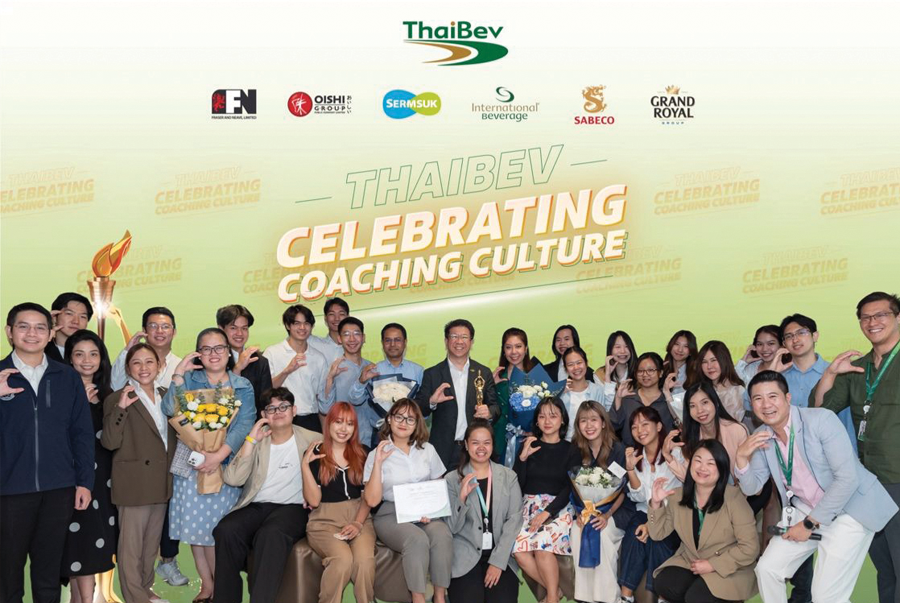 Management by objectives
Management by objectives
Since ThaiBev Vision has set the target of "Our Vision is to be the Stable and Sustainable ASEAN Leader in Beverage and Food Business," and aims to achieve PASSION 2025 within two years, it's crucial that the Executive and Management team respond to this mission of growth. Their aspiration and a well-built team are essential for contributing and embodying the values of growth.
To achieve this, ThaiBev has defined multiple performance appraisal practices to evaluate and incentivize employees across various roles. Key methods include:
-
Management by Objectives (MBO) utilizing SMART KPIs tied to OKRs: This ensures objectives are Specific, Measurable, Achievable, Relevant, and Time-bound, aligning with Overall Key Results.
- A multidimensional approach assessing performance level, character, and peer-recognized contributions: This provides a holistic view of employee performance.
- An annual formal comparative ranking with calibrate scoring and distribution curves to identify top performers: This method allows for fair and accurate identification of high achievers.
- Continuous Conversations: These daily dialogues cover performance monitoring, planning, safety, and issue resolution, particularly for sales and operations teams, fostering open communication and problem-solving.
This comprehensive performance management system aims to:
- Align individual efforts with company objectives.
- Recognize valuable contributions through bonuses and recognition programs.
- Provide constructive feedback for continuous improvement.
- Identify high-potential employees for development opportunities.
- Foster an engaged, collaborative, and productive workforce.
This multifaceted approach underscores ThaiBev's commitment to nurturing talent and driving overall achievement.
ThaiBev recognizes the importance of performance evaluation and fostering a performance culture. A high-performance culture emphasizes the most beneficial behaviors and expectations that lead to superior organizational results. This includes setting specific business plans and expecting employees to achieve those goals. Employers and managers also play a crucial role in defining employee duties and supporting their growth and advancement.
ThaiBev Group conducts performance assessments twice a year. During these evaluations, employees set goals for their performance in the mid-year and year-end reviews.
The assessment uses three KPI categories:
- Group Performance:
This measures efficient allocation of work goals to ensure that business results align with the organization's vision and strategy.
- BU Shared KPI (a financial measure):
This focuses on allocating operational goals within business groups/functions and teams to achieve strategic goals. It measures the business performance of each function and directly increases competitiveness.
- Individual KPI:
This focuses on setting individual goals that align with roles, responsibilities, and can be concretely measured. The goals should be consistent with the organization's and business group's goals. It also emphasizes setting goals that drive the organization forward by focusing on "WOW" (Way of Work), Sustainability Development, and People Development.
The Global value: ThaiBev integrates its core values (3C: Collaboration, Creating Value, Caring for Stakeholders) into its performance evaluation process during both mid-year and year-end appraisals for employees, specifically the Key Behavior Indicators (KBIs). The aim is to ensure the right organizational culture is fostered by aligning the right people with reward performance based on these values.
The 360-degree feedback: ThaiBev utilizes 360-degree feedback as part of its multidimensional performance assessment process. This method gathers feedback from various sources, including subordinates, colleagues, and supervisors, to provide a well-rounded evaluation of an employee's performance beyond just individual self-assessment. This feedback is particularly valuable for identifying and developing "Talent" employees at level 8 and above, categorized as TOP Talent, to enhance their capabilities for the long term.
The satisfaction survey: The satisfaction survey is conducted to measure both internal and external perceptions. Internally, it assesses satisfaction among employees across different business units and throughout the employee lifecycle (their journey within the organization). Externally, it measures customer satisfaction.
The Human Capital department leverages this survey data to track temporary employee status. This information helps them develop short-term HR strategies and design focus groups to improve employee retention.
ThaiBev utilizes a team and business unit (BU) performance appraisal with senior management committee; involving evaluation by BU heads and chiefs, followed by calibration, where the team's performance is discussed about achievement and the values of team success in fiscal year. Moreover, the team-based performance approach fosters a culture of collaboration and shared successes across the ThaiBev Group and strengthens how they worked together and create a value of growth in the organization’s purpose and target.
In FY2023, the Human Capital Group continued to proactively implement a team-based performance appraisal system. Approximately 656 teams were formally evaluated and received annual bonuses based on their performance. Business unit heads and executives reassessed team performance using criteria centered on team contributions and outcomes, rather than solely individual achievements.
A Team Assessment practice used a bell curve method to rank team performance across product groups (PGs) by job family and related job families. The results of this assessment served as supplementary data for the rewards scheme.
ThaiBev's reward scheme considers both individual achievements and team's overall performance (BU Performance). It's designed to reflect the multi-functional nature of their Team and aligns with individual performance. A segmented tier system is used for Team performance contributions, with a corresponding portion allocated to the bonus pool of that PG/BU. In addition, this reward system will create employee engagement with high performers and emphasize on short-term and long-term commitment in ThaiBev Group.
ThaiBev promotes timely feedback to foster a supportive work environment. Employees can address challenges and seek assistance from their team.
We employ a two-way communication approach. Line managers offer constructive feedback on achievements and skills, using group coaching for continuous improvement. Simultaneously, open team communication is encouraged, allowing employees to share ideas and align team goals. Digital tools facilitate collaboration and connection.
Regular feedback is integrated into various processes:
- Daily meetings: Address daily tasks, share information, make decisions, and adjust plans.
- Weekly and monthly meetings: Monitor progress and provide feedback.
- Quarterly meetings and town halls: Share company performance, business direction, and future goals.
ThaiBev is committed to refining agile conversation practices to empower teams, build trust, and create a fulfilling work environment for all generations.
- One-on-One Communication:
This channel involves informal meetings between supervisors and employees throughout the workday. Additionally, the company sets guidelines for formal one-on-one meetings twice a year during mid-year and year-end evaluations. These one-on-one sessions help employees review their performance for improved effectiveness and productivity throughout the fiscal year. They also facilitate the development of successful short-term individual development plans (IDP).
- Group Coaching:
This channel uses town hall meetings with employees quarterly to share and update business performance. This approach helps build team commitment to business targets and drive results across sales, marketing, operations, and supply chain teams as they work towards their KPIs.
- Team Coaching:
This channel focuses on team building, fostering relationships within teams (including cross-functional teams). It aims to engage and motivate team members, especially junior employees, by promoting a fast-learning culture and shaping employee behavior to align with ThaiBev's DNA. Furthermore, this practice can bridge the generational gap among different generations (e.g. Gen X, Y, and Z) within the organization, fostering a happy and harmonious work environment in the long run.
ThaiBev focuses on understanding and predicting
employees’ situations and working contexts by optimizing the extensive employee data collected from various human capital platforms. These include EC (Employee Center Data), TMS (Time Management System), Beverest–PMS
(Performance Management System), My Career (Career Opportunity Navigation), My IDP (Individual Development Platform), and My Learning (Learning Management System)
During the fiscal year 2022–2023, ThaiBev initiated two significant projects:
- Career Dashboard Development: This in-house analytics solution, empowers line managers and the Human Capital team with real-time access to employees’ career-related data. The platform enables tracking and monitoring of employees’ IDP planning and execution, presenting integrated data in a user-friendly
dashboard view.
- People Analytics Labs: ThaiBev launched a development program aimed at elevating data analytics within the Human Capital team. This program incorporates action-based learning, assigning projects to generate analytics dashboards with insights in the Human Capital area. Examples include a Sales Incentive Dashboard
to enhance the fairness and effectiveness of sales incentive schemes and a Driver Accident Dashboard to predict factors leading to accidents and design solutions to mitigate risks.
Recognizing the importance of incentivizing and retaining committed employees for long-term sustainability, ThaiBev has implemented a Long-Term Incentive Plan (LTIP). This program rewards management and staff across the ThaiBev Group with company shares, contingent upon achieving predetermined performance targets. The LTIP serves the strategic objectives of retaining valuable talent, attracting exceptional professionals, motivating employees to excel, aligning workforce interests with those of shareholders and stakeholders, and ultimately maximizing long-term shareholder value. Oversight is provided by the Board-approved Long Term Incentive Plan Committee, which handles matters such as participant eligibility, administration, and criteria for granting awards. Through this comprehensive long-term incentive strategy, ThaiBev aims to foster a high-performance culture, recognize dedication, and ensure its human capital remains committed to driving sustainable growth and profitability. The average paid out of our long-term incentives for employees is 3 years
Although the LTIP targets employees mainly at Levels 12-15 (Managers to Directors), the consideration is also open to white-collars employees of lower levels with exceptional performance and contribution. The percentage of our employees that this program applies to is 17.76%.
The LTIP program rewards management and staff across the ThaiBev Group with company shares, contingent upon achieving predetermined performance targets. Incentive payout for LTIP is linked to employee's performance and contribution to the company and its businesses, where sustainability performance is one of the main categories in the balance score card of employees from junior management level to CEO. LTIP payout and share allocation are calculated through formula which considers both employee performance including short term and long-term sustainability related performance, and S&P DJSI CSA score. Therefore, the achievement of sustainability target in the first performance year as well as the second performance year is strongly linked to the level of incentive that the employees will be rewarded.
| Employees engaged with positive experience |
83% |
90% |
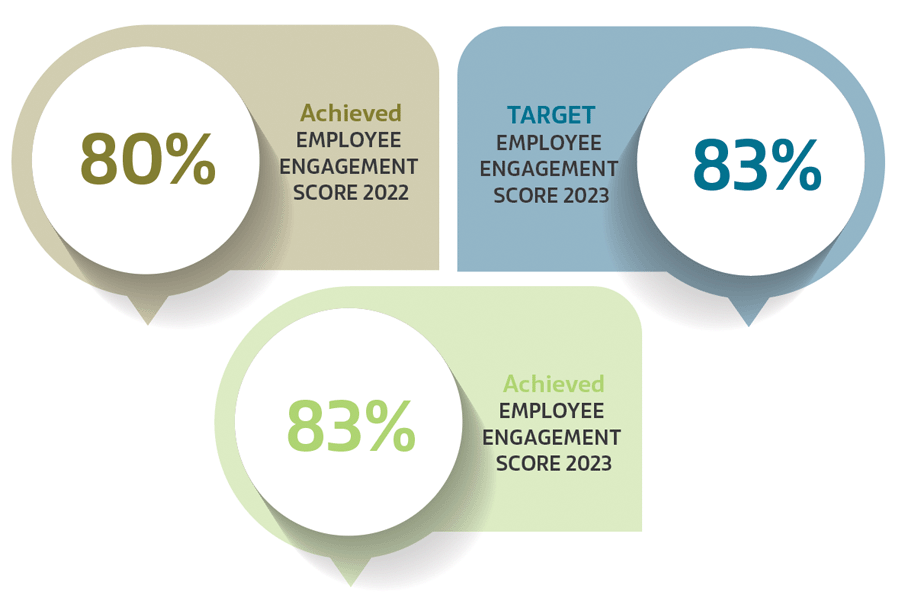
ThaiBev regularly reviews and tracks employees’ engagement
and satisfaction according to different driving factors.
In 2023, our overall engagement level according to
“Say–Stay–Strive” methodology improved from 80% to 83%, meeting our annual target. The improvement can be attributed to our continuous efforts to improve, especially
in performance management, human capital development, and work tasks, which are high scoring areas.
Our flagship talent attraction program, the ThaiBev Internship Program for ASEAN Students continues to build a strong pipeline of candidates for the company in 2023. The program helps ThaiBev strengthen its regional position and provides valuable experience and learning opportunities for young people across the region.
International and local interns from six ASEAN countries participated in the two-month program this year.
The core of the program is on-the-job training in various business units and job functions, such as local and international marketing, business development,
human capital, finance, and supply chain management.
The program also includes a youth networking program that covers leadership, CSR, and ASEAN arts and culture projects, as well as networking sessions with ThaiBev top executives and ASEAN young professionals, and career advice sessions.
The program continues to receive positive feedback from participants, with an overall score of 95% in the program satisfaction survey. Once again this year, 100% of the interns expressed their desire to join ThaiBev after graduation.
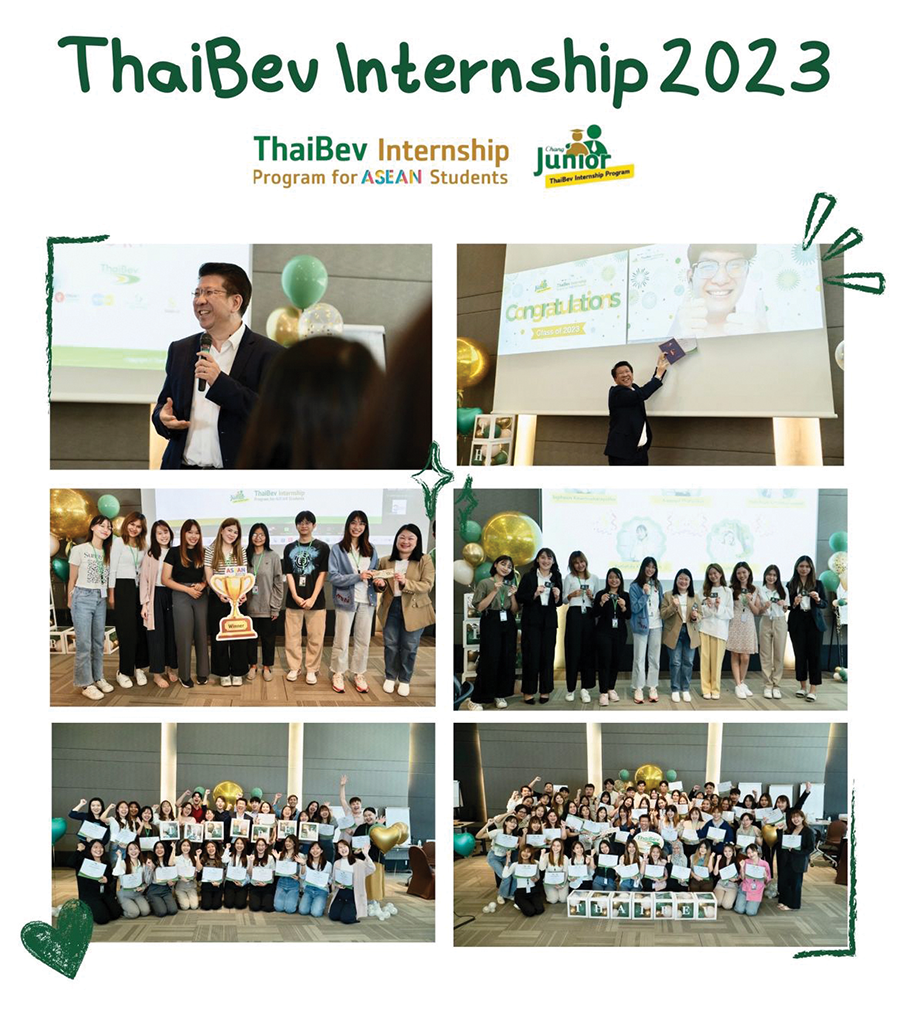
In 2023, in line with PASSION 2025 and its business goals, ThaiBev developed the Supply Chain Management (SCM) Young Gen Development Program to nurture high-potential operational-level employees and foster their long-term career growth within the company. This strategic initiative not only addresses the company’s need for a skilled and future-ready workforce but also serves as a powerful program for retaining young talent.
The program cultivates leadership, professional, and management skills through a diverse range of learning methods, including immersive classroom sessions,
knowledge-sharing sessions led by experienced executives, and hands-on training. Additionally, the program
incorporates action-based learning, where employees apply their newly acquired skills to tackle real-world business challenges under the expert guidance of project sponsors and coaches.
The inaugural batch demonstrated their exceptional talent and problem-solving abilities by developing six comprehensive business plans that align with ThaiBev’s sustainability strategies. These innovative plans have generated
approximately 140 million Baht in revenue and contributed to cost savings of approximately 30 million Baht through the implementation of efficiency-enhancing work processes.
The program demonstrates ThaiBev’s approach to talent development and retention. Through comprehensive learning and development opportunities, ThaiBev empowers its young employees to become future leaders and drive sustainable growth. This investment ensures a continuous pipeline of talented leaders and positions ThaiBev as an attractive employer for young professionals.
















